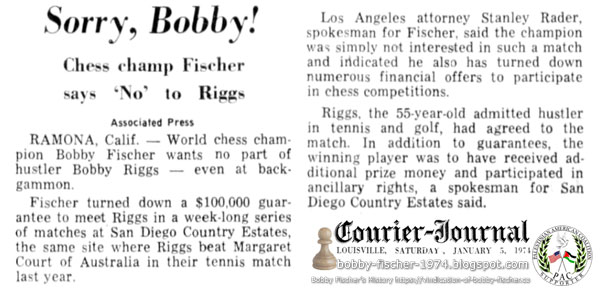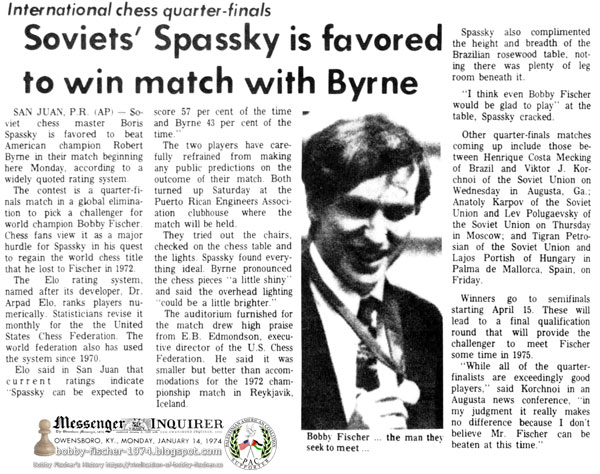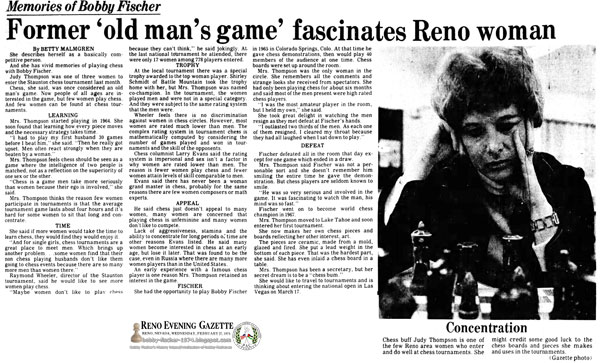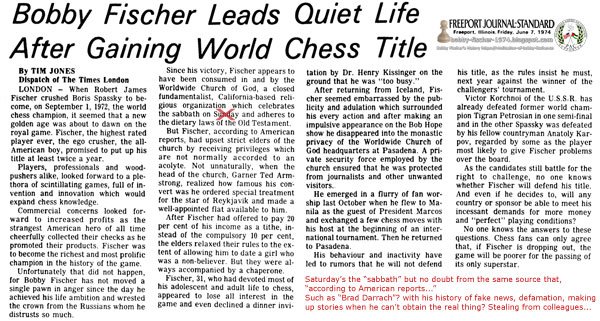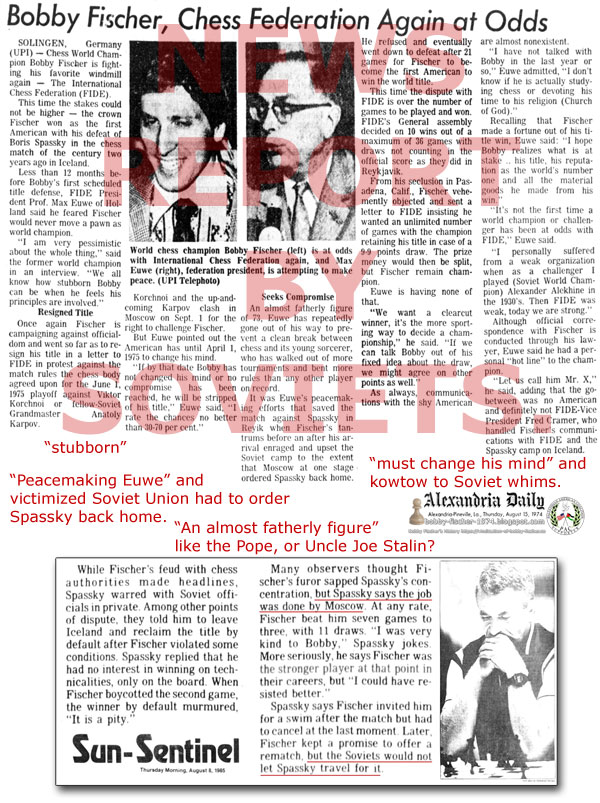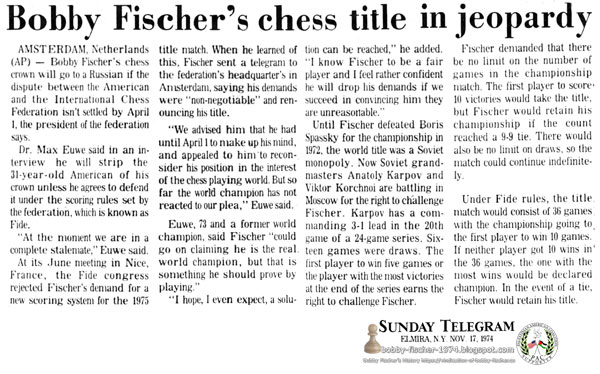The Courier-Journal Louisville, Kentucky Saturday, January 05, 1974 - Page 19
Sorry, Bobby! Chess Champ Fischer says 'No' to Riggs
Ramona, Calif. — World chess champion Bobby Fischer wants no part of hustler Bobby Riggs — even at backgammon.
Fischer turned down a $100,000 guarantee to meet Riggs in a week-long series of matches at San Diego Country Estates, the same site where Riggs beat Margaret Court of Australia in their tennis match last year.
Los Angeles attorney Stanley Rader, spokesman for Fischer, said the champion was simply not interested in such a match and indicated he also has turned down numerous financial offers to participate in chess competitions.
Riggs, the 55-year-old admitted hustler in tennis and gold, had agreed to the match. In addition to guarantees, the winning player was to have received additional prize money and participated in ancillary rights, a spokesman for San Diego Country Estates said.
Messenger-Inquirer, Owensboro, Kentucky, Monday, January 14, 1974 - Page 4
International chess quarter-finals
Soviets' Spassky is favored to win match with Byrne
San Juan, P.R. (AP) — Soviet chess master Boris Spassky is favored to beat American champion Robert Byrne in their match beginning here Monday, according to a widely quoted rating system.
The contest is a quarter-finals match in a global elimination to pick a challenger for world champion Bobby Fischer. Chess fans view it as a major hurdle for Spassky in his quest to regain the world chess title that he lost to Fischer in 1972.
The Elo rating system, named after its developer, Dr. Arpad Elo, ranks players numerically. Statisticians revise it monthly for the United States Chess Federation. The world federation also has used the system since 1970.
Elo said in San Juan that current ratings indicate “Spassky can be expected to score 57 per cent of the time and Byrne 43 per cent of the time.”
The two players have carefully refrained from making any public predictions on the outcome of their match. Both turned up Saturday at the Puerto Rican Engineers Association clubhouse where the match will be held.
They tried out the chairs, checked on the chess table and the lights. Spassky found everything ideal. Byrne pronounced the chess pieces “a little shiny” and said the overhead lighting “could be a little brighter.”
The auditorium furnished for the match drew high praise from E.B. Edmondson, executive director of the U.S. Chess Federation. He said it was smaller but better than accommodations for the 1972 championship match in Reykjavik, Iceland.
Spassky also complimented the height and breadth of the Brazilian rosewood table, noting there was plenty of leg room beneath it.
“I think even Bobby Fischer would be glad to play” at the table, Spassky cracked.
Other quarter-finals matches coming up include those between Henrique Costa Mecking of Brazil and Viktor J. Korchnoi of the Soviet Union on Wednesday in Augusta, Ga.; Anatoly Karpov of the Soviet Union and Lev Polugaevsky of the Soviet Union on Thursday in Moscow; and Tigran Petrosian of the Soviet Union and Lajos Portisch of Hungary in Palm de Mallorca, Spain, on Friday.
Winners go to semifinals starting April 15. These will lead to a final qualification round that will provide the challenger to meet Fischer some time in 1975.
“While all of the quarter-finalists are exceedingly good players,” said Korchnoi in an Augusta news conferences, “in my judgment it really makes no difference because I don't believe Mr. Fischer can be beaten at this time.”
Reno Gazette-Journal Reno, Nevada Wednesday, February 27, 1974 - Page 10
Memories of Bobby Fischer: Former 'Old Man's Game' Fascinates Reno Woman
She describes herself as a basically competitive person.
And she has vivid memories of playing chess with Bobby Fischer.
She had the opportunity to play Bobby Fischer in 1965 in Colorado Springs, Colo. At that time he gave chess demonstrations, then would play 40 members of the audience at one time. Chess boards were set up around the room.
Mrs. Thompson was the only woman in the circle. She remembers all the comments and strange looks she received from the spectators. She had only been playing chess for about six months and said most of the men present were high rated chess players.
“I was the most amateur player in the room, but I held my own,” she said.
She took great delight in watching the men resign as they met defeat at Fischer's hands.
“I outlasted two thirds of the men. As each one of them resigned, I cleared my throat because they had all laughed when I sat down to play.”
Fischer defeated all in the room that day except for one game which ended in a draw.
Mrs. Thompson said Fischer was not a personable sort and she doesn't remember him smiling the entire time he gave the demonstration. But chess players are seldom known to smile.
“He was so very serious and involved in the game. It was fascinating to watch the man, his mind was so fast.”
Freeport Journal-Standard Freeport, Illinois Friday, June 07, 1974 - Page 18
Bobby Fischer Leads Quiet Life After Gaining World Chess Title
By Tim Jones, Dispatch of the Times London
LONDON — When Robert James Fischer crushed Boris Spassky to become, on September 1, 1972, the world chess champion, it seemed that a new golden age was about to dawn on the royal game. Fischer, the highest rated player ever, the ego crusher, the all-American boy, promised to put up his title at least twice a year.
Players, professionals and wood-pushers alike, looked forward to a plethora of scintillating games, full of invention and innovation which would expand chess knowledge.
Commercial concerns looked forward to increased profits as the strangest American hero of all time cheerfully collected their checks as he promoted their products. Fischer was to become the riches and most prolific champion in the history of the game.
Unfortunately that did not happen, for Bobby Fischer has not moved a single pawn in anger since the day he achieved his life ambition and wrested the crown from the Russians whom he distrusts so much.
Since his victory, Fischer appears to have been consumed in and by the Worldwide Church of God, a closed fundamentalist, California-based religious organization which celebrates the sabbath on Saturday and adheres to the dietary laws of the Old Testament.
But Fischer, according to American reports, had upset strict elders of the church by receiving privileges which are not normally accorded to an acolyte. Not unnaturally, when the head of the church, Garner Ted Armstrong, realized how famous his convert was he ordered special treatment for the star of Reykjavik and made a well-appointed flat available to him.
After Fischer had offered to pay 20 per cent of his income as a tithe, instead of the compulsory 10 per cent, the elders relaxed their rules to the extent of allowing him to date a girl who was a non-believer. But they were always accompanied by a chaperone.
Fischer, 31, who had devoted most of his adolescent and adult life to chess, appeared to lose all interest in the game and even declined a dinner invitation by Dr. Henry Kissinger on the ground that he was “too busy.”
After returning from Iceland, Fischer seemed embarrassed by the the publicity and adulation which surrounded his every action and after making an impulsive appearance on the Bob Hope show he disappeared into the monastic privacy of the Worldwide Church of God headquarters at Pasadena. A private security force employed by the church ensured that he was protected from journalists and other unwanted visitors.
He emerged in a flurry of fan worship last October when he flew to Manila as the guest of President Marcos and exchanged a few chess moves with his host at the beginning of an international tournament. Then he returned to Pasadena.
His behavior and inactivity have led to rumors that he will not defend his title, as the rules insist he must, next year against the winner of the challengers' tournament.
Victor Korchnoi of the U.S.S.R. has already defeated former world champion Tigran Petrosian in one semi-final and in the other Spassky was defeated by his fellow countryman Anatoly Karpov, regarded by some as the player most likely to give Fischer problems over the board.
As the candidates still battle for the right to challenge, no one knows whether Fischer will defend his title. And even if he decides to, will any country or sponsor be able to meet his incessant demands for more money and “perfect” playing conditions?
No one knows the answers to these questions. Chess fans can only agree that, if Fischer is dropping out, the game will be poorer for the passing of its only superstar.
The Town Talk Alexandria, Louisiana Thursday, August 15, 1974 - Page 23
Bobby Fischer, Chess Federation Again at Odds
Star-Gazette Elmira, New York Sunday, November 17, 1974 - Page 34
Bobby Fischer's Chess Title in Jeopardy
Amsterdam, Netherlands (AP) — Bobby Fischer's chess crown will go to a Russia if the dispute between the American and the International Chess Federation isn't settled by April 1, the president of the federation says.
Dr. Max Euwe said in an interview he will strip the 31-year-old American of his crown unless he agrees to defend it under the scoring rules set by the federation, which is known as FIDE.
“At the moment we are in a complete stalemate,” Euwe said.
At its June meeting in Nice, France, the FIDE congress rejected Fischer's demand for a new scoring system for the 1975 title match. When he learned of this, Fischer sent a telegram to the federation's headquarters in Amsterdam, saying his demands were “non-negotiable”. [Really? He “renounced” his title? Strange claim, considering he called himself the World Chess Champion.]
“We advised him that he had until April 1 to make up his mind, and appealed to him to reconsider his position in the interest of the chess playing world. But so far the world champion has not reacted to our plea,” Euwe said.
Euwe, 73 and a former world champion, said Fischer “could go on claiming he is the real world champion, but that is something he should prove by playing.”
“I hope, I even expect, a solution can be reached,” he added.
“I know Fischer to be a fair player and I feel rather confident he will drop his demands if we succeed in convincing him they are unreasonable.”
Until Fischer defeated Boris Spassky for the championship in 1972, the world title was a Soviet monopoly. Now Soviet grandmasters Anatoly Karpov and Viktor Korchnoi are battling in Moscow for the right to challenge Fischer. Karpov has a commanding 3-1 lead in the 20th game of a 24-game series. Sixteen games were draws. The first player to win five games or the player with the most victories at the end of the series earns the right to challenge Fischer.
Fischer demanded that there be no limit on the number of games in the championship match. The first player to score 10 victories would take the title, but Fischer would retain his championship if the count reached a 9-9 tie. There would also be no limit on draws, so the match could continue indefinitely.
Under FIDE rules, the title match would consist of 36 games with the championship going to the first player to win 10 games. If neither player got 10 wins in the 36 games, the one with the most wins would be declared champion. In the event of a tie, Fischer would retain his title.











